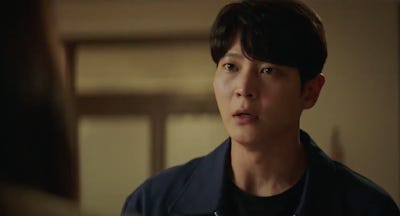Alice (2020) Quantum Entanglements
After my initial disappointment with Episode 13, it occurred to me that a rewatch of the two most recent episodes was needed while jotting down important details along the way. It turned out to be a beneficial exercise and I came away from it with more understanding of all the moving parts. I also did a bit of reading on quantum entanglement as far as a non-science person like myself is capable of getting my head around it. It was an often cited concept in the crime show Numb3rs by the drama's resident physicist to wax philosophical about the mysteries of human relationships.
Here quantum entanglement serves both as a sci-fi explanation for what's going on with Tae-yi and Jin-gyeom with regards to doppelgangers but also as a larger metaphor for the connection between souls across distance. We also saw examples of this in Tae-yi's final audio message to Min-hyuk, as well as Do-yeon's ability to sense things in relationship with Jin-gyeom and connect with him.
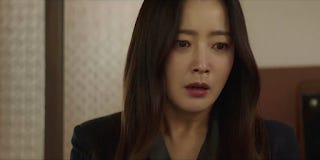
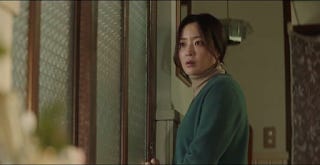
I’ve gradually come to conclusion that the biggest obstacle to clarity has been the fact that Mother Tae-yi is a self-styled enigmatic figure and an unreliable source of information. All the time she was running around for her son's sake, spouting cryptic comments, she was a woman with a mission. I should have guessed pretty much from the start that she was all about Jin-gyeom as was clearly shown in Episode 1. She gave up everything for him… including the man she purportedly loved so that her son could live with some degree of normality. The second mistake I made was trying to make sense of the time travel mumbo jumbo without giving more consideration to the traditions and mythological roots that the show was derivative of. Sure there were the obvious nods to Lewis Carroll’s Alice but I should have twigged a lot sooner that the Book of the Prophecy takes its tonal cues from the book of Revelation in the Bible. After mulling over the last page especially of the snake-like creature coiling itself around the Alice figure it finally struck me that the idea was drawn, in all likelihood, from Revelation chapter 12.
She was pregnant and was crying out in birth pains and the agony of giving birth. And another sign appeared in heaven: behold a great red dragon, with seven heads and ten horns and on his heads seven diadems… And the dragon stood before the woman who was about to give birth so that when she bore her child he might devour it. She gave birth to a male child, one who is to rule all the nations with a rod of iron, but her child was caught up to God and to his throne…And the great dragon was thrown down, that ancient serpent, who is called the devil and Satan, the deceiver of the whole world… (Revelation 12: 2-9)
Tae-yi who birthed Jin-gyeom is possibly the key to making sense of all of this. She is portrayed as the quintessential Mother archetype in the Jungian schema. She protects her child at all costs, nurtures him and clings to the hope that despite the prophetic utterances of doom, he can transcend his birth defect and defy whatever destiny awaits him in the ominous future. As far as I’m to understand her, the reset has never been an option for her because it means that all the effort she gave to bringing JG into the world and raising him would be rendered meaningless. All the memories gone. He, they would be rubbed out of existence. Her maternal instincts revolted against that. As Do-yeon notes succinctly, “she lived for [Jin-gyeom]”. Moreover, both mother and son are figures from the future. Neither should have existed in the past. Mother and son are/were living, breathing paradoxes around family and friends. I would go so far as to say that their presence in the past upset a certain time-space balance as seen in the chaos that has resulted in the worst case scenario of doppelgängers killing doppelgängers, for instance to keep time travel going. I wonder too if that's why Mother Tae-yi has to die because some things have to happen for balance to be restored and she would only be a hindrance.
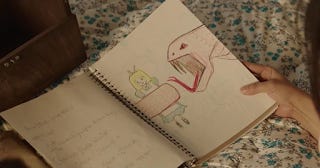
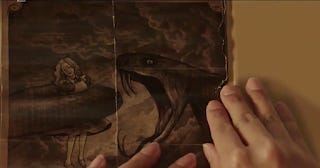
In a blog post that I read on the Mother archetype, the writer notes that evil symbols of the Mother include witches, dragons, graves among others. The dragon could also be a substitute for serpents or any entwining creature. (Purrington 2020) It leads me to wonder if the writer of Alice isn’t pointing to Mother Tae-yi who started it all, who couldn’t stop it because of her attachment to her child is the one who (as symbolised in the picture by the serpentine creature) is inadvertently destroying the time fabric. That’s why she has to die. That’s why despite everything that JG does to save her life ultimately fails. So far. The ensuing chaos that we’ve been privy to since the start of the drama was caused by her both directly and indirectly. Of course the exploits of the Alice group have exacerbated this fiasco. Whether it’s opening the way for time travel, whether it’s causing rifts in the space-time continuum or the possible merging of timelines. Or just staying behind in 1992 to have her son.
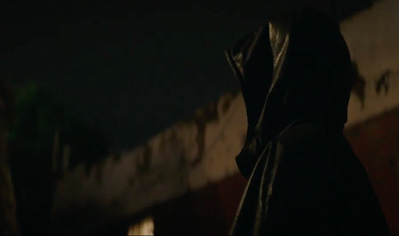
The mysterious hooded figure is a curious beast. What we do know is that he has a biological and psychic connection to Jin-gyeom (an extreme negatively charged quantum entanglement) causing the latter to act as if he’s suffered a psychotic break, descending into schizophrenia and even dissociative personality disorder. It's also a clever way of framing mental health issues in line with time travel. The implication from the DNA test is that he is Jin-gyeom’s doppelgänger. Whoever he is, he is styled as a grim reaper or at least a harbinger of death who has the ability to time hop and mete out his brand of justice. He carries a sword which doubles up as an executioner’s weapon. He may or may not be the creation of Mother Tae-yi, the god-like figure that rules over time and becomes the destroyer described in that final page. What fascinates me though is that while Jin-gyeom was busy trying to kill Detective Kim, the voice of Do-yeon shrieking his name jerked him out of his stupor, causing him to stop in his tracks. This in all probability is Do-yeon’s role. To restrain and to pull him back from being swallowed up by the abyss. She is someone who has a special bond with him. My guess is that she is someone who can prevent him from succumbing to the darkness that threatens to overwhelm him.
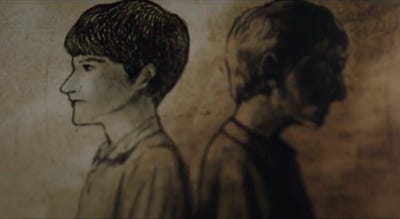
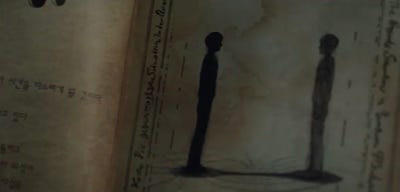
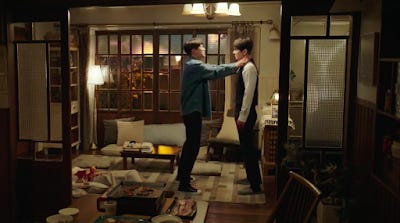
My mind turned to the “evil twin” trope as Jin-gyeom was threatening to throttle his other self before the grim reaper character showed up and proceeded to stab him with a small sword. This took me to consider Zoroastrian dualism — good vs evil in an almighty cosmic battle cutting across time and space. According to the Wikipedia entry I read, the Zurvanite branch of Zoroastrianism simplified that worldview by stating that co-eternal twins born of “zurvan” or time, represent this dualistic dynamic. Zurvanism’s doctrinal underpinnings came from its interpretation of free will. Good and evil are choices made by mortals. This indicates to me that Jin-gyeom will have to play out the contest between good and evil as he fends off the voices in his head to act against his true self as well as deal with the Teacher cult who co-opt him for their cause. The evil twin motif isn’t just about Jin-gyeom. It seems to be a common thread as we see future and past selves battle it out in different ways at different times.
“Only the present matters… the people around you” that was Ahjussi Ko Hyeon-seok’s final words to JG. But JG seems adamant about not taking Ahjussi’s advice. This is why he keeps popping up in 2010 and making a muck of things. He can’t let go of the past. Two times he travels back there but for one reason or another she dies at the same time on the same day. He is his mother’s son undoubtedly. Neither are able to let go of the other despite knowing the dangers that are hand. Furthermore, Jin-gyeom’s fixation with his mother’s murder has resulted in him brushing off the people right in front of him. Like Do-yeon, like Detective Kim and even Min-hyuk. Sure, it’s important to find the culprit and get some resolution and closure from that. But in the meantime life has to be lived with the people within one’s circle.
Undoubtedly this is ultimately a celebration of mother’s love in the extreme. It is extreme because she should have gone for the reset a long time ago perhaps especially because she had an inkling of what’s to come. It’s a double-edged sword. The love of mother transcends all else and she was quite possibly hoping that if she did her best to bring up Jin-gyeom well she could change the future and his fate. That could well still happen although things are so chaotic that I’m more inclined to think that only a reset could stop all the madness and confusion. I could be wrong but the show seems to be pointing to an inevitable zero sum game. Mitigating the effects of time travel won't be enough.
I’m actually quite keen to see what happens with the reset. Would it necessarily be a world without Park Jin-gyeom? He might not be Park Jin-gyeom as we know him but he might be Yoo Jin-gyeom growing up, living his life in the future with his doting mum and dad. Assuming of course that Tae-yi and Min-hyuk would meet somehow even without the Alice connection.
There is an increasing sense that things are not what they should be. Things are topsy turvy somewhat like it is in Alice’s Adventures in Wonderland. That was patently clear especially in that poignant audio message from the past that finally reached Min-hyuk. Which was absolutely the highlight of episode 14 for me. The regret that the two people separated by time and pace were feeling were palpable. The thoughts going through their minds were so beautifully encapsulated in that brief moment of quantum entanglement. They should have been together, they should have done this together. She didn’t have to raise that child on her own. He should have been there for her and their son. They could have fought this battle together as a family. The grief and loss felt by Min-hyuk was wonderfully portrayed by Kwak Si-yang.
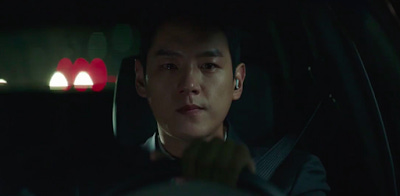
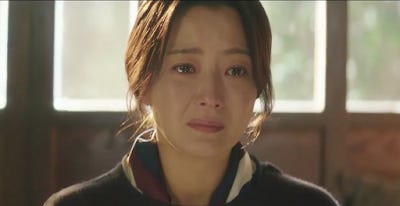
The difference between Min-hyuk (and perhaps this accounts for his popularity) and Jin-gyeom seems largely to be a matter of acceptance. Min-hyuk has witnessed first hand and quickly come to the realisation that the past isn’t something to be meddled with regardless of how painful certain events are. I’m sure there are things he’d like to have changed. He has the power to do it. But he realises he can’t just go back in time and “fix” things without ripple effects on unwitting bystanders. Ultimately, there is something selfish about going back to the past and changing it for one’s benefit without having to take responsibility for the consequences of doing so. In all honesty no mere mortal can. For me Min-hyuk is someone who understands his own part in this, the mistakes he made in this entire scenario understands the nub of the problem and comes to the right conclusion on his own. As someone who was part of the system which caused it. He also acknowledges that there's something inherently corrupting about time travel. That kind of absolute power corrupts absolutely. No mere mortal can wield it without losing him/herself in it. At this point between Min-hyuk and Jin-gyeom, it’s obvious who the father is... who is the adult in the room.
My favourite exchange in Lewis Carroll’s Alice is the one between Alice and the Cheshire-Cat.
“Would you tell me, please, which way I ought to go from here?”
“That depends a good deal on where you want to get to,” said the Cat.
“I don’t much care where — “ said Alice.
“Then it doesn’t matter which way you go,” said the Cat.
“— so long as I get somewhere,” Alice added as an explanation.
“Oh, you’re sure to do that,” said the Cat, “if you only walk long enough.”
The destination does matter in determining the route taken. Does Jin-gyeom want to catch the person who killed his mother? Or does he want to stop her from dying? It seems to me perhaps he might not be allowed to do both. He can no longer grope around in the dark aimlessly lurching from crisis to crisis. It isn't just that his soul is at stake but lives everywhere.
According to the drama time travel is unnatural and not how life should be lived as seen in the way it splits up families and causes confusion in relationship dynamics. The past isn't a tourist destination or a psychodrama to be reenacted. What it is, is lived experience to inform the traveller of how the present and the future can be better lived out. Death, grief and loss are part of the stark realities of life but life has to go on for the ones who remain. Those who remain have people under their noses who need them, who rely on them to move on. Those who are gone will not be forgotten but any regrets about the departed should be a reminder that the same mistakes don't have to repeated and lead to a heavier burden of more regrets by ignoring those right in front of us.
